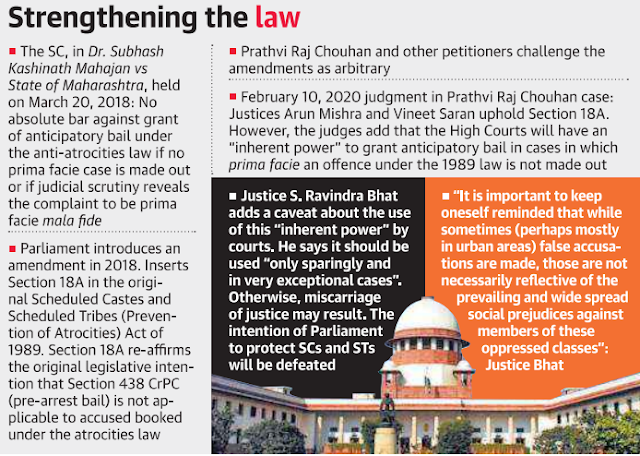Indian Polity
SC Upholds Changes to SC/ST Atrocities Law
- 11 Feb 2020
- 3 min read
Why in News
The Supreme Court has upheld the constitutional validity of the Scheduled Castes and the Scheduled Tribes (Prevention of Atrocities) Amendment Act, 2018.
- The Amendment Act nullified the Court’s 20th March, 2018 judgment which had diluted the stringent provisions of the original Scheduled Castes and the Scheduled Tribes (Prevention of Atrocities) Act, 1989.
- Petitions were filed challenging the 2018 Amendment Act on the grounds of violation of the fundamental right to equality (Article 14) and personal liberty (Article 21).
Salient Features of the Amendment Act, 2018
- It added Section 18A to the original Act.
- It delineates specific crimes against Scheduled Castes and Scheduled Tribes as atrocities and describes strategies and prescribes punishments to counter these acts.
- It identifies what acts constitute “atrocities” and all offences listed in the Act are cognizable. The police can arrest the offender without a warrant and start an investigation into the case without taking any orders from the court.
- The Act calls upon all the states to convert an existing sessions court in each district into a Special Court to try cases registered under it and provides for the appointment of Public Prosecutors/Special Public Prosecutors for conducting cases in special courts.
- It creates provisions for states to declare areas with high levels of caste violence to be “atrocity-prone” and to appoint qualified officers to monitor and maintain law and order.
- It provides for the punishment for wilful neglect of duties by non-SC/ST public servants.
- It is implemented by the State Governments and Union Territory Administrations, which are provided due central assistance.
Section 18A states that
- For the Prevention of Atrocities Act, the preliminary enquiry shall not be required for registration of a First Information Report against any person.
- The provision of section 438 (pre-arrest bail) of the Code of Criminal Procedure (CrPC) shall not apply to a case under the Act, notwithstanding any judgment or order or direction of any Court.





